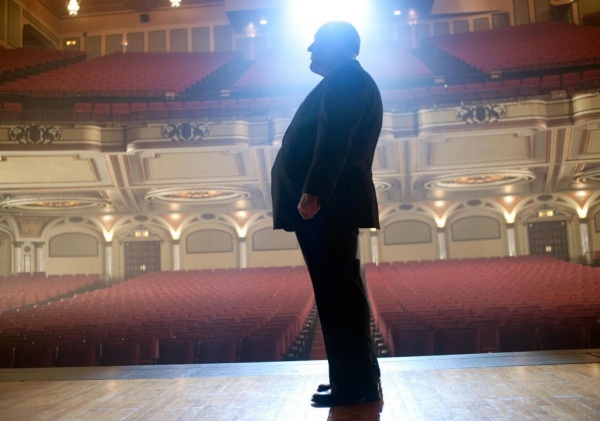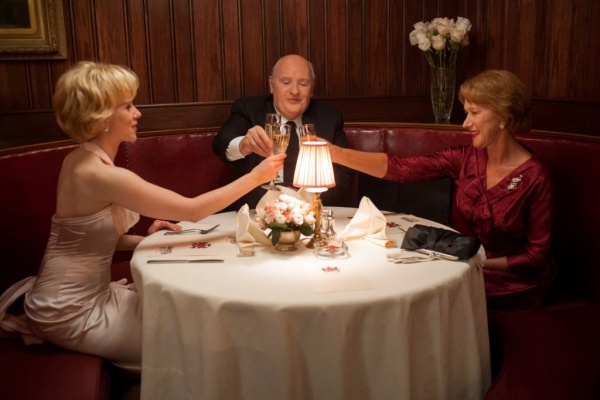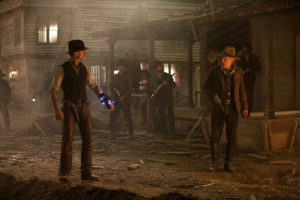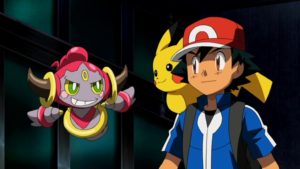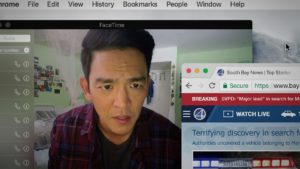The surname for a title may suggest a biographic epic, but instead, Hitchcock focuses on the issues that surrounded the director during the production of Psycho. Adapted from Stephen Rebello’s book, Alfred Hitchcock and the Making of Psycho, it just seems odd that someone out there thought it would be a good idea to create a film out of it. There’s only so much you can say on the making of a film, so in comes some marital drama, a sprinkle of speculation, and Ed Gein.
Following the success of his film North by Northwest, Alfred Hitchcock (Anthony Hopkins) is asked whether he has considered retirement. At 60 years old, he tells his wife Alma Reville (Helen Mirren) his worry that he has become too old and also sees from a newspaper article that there is already a list of upcoming directors being labelled the next Hitchcock. His personal assistant Peggy (Toni Collette) suggests that he bring Robert Bloch’s novel Psycho to the screen, itself inspired by the killer Ed Gein. Upon reading it Hitchcock is firmly set on making Psycho his next film, yet due to its violent nature, as well as themes of transvestism and incest, everyone else thinks that he’s making a big mistake. With Paramount boss Barney Balaban (Richard Portnow) refusing to back the film, Hitchcock is forced to finance it with his own money, even mortgaging his house.
“My association with television has cheapened me,” says Hitchcock of his then popular Alfred Hitchcock Presents series. He was one of the few directors who became just as famous for his directing methods and his image (even that iconic shadow makes a few appearances), often starring in the trailers to his films. Hitchcock the film expects the audience to be fairly clued in on the director’s work. Yet this is just as much about his relationship with his wife Alma than it is about the making of Psycho. It could be argued that calling the film Alma Reville might be more appropriate, but doing so would mean that hardly anyone would turn up.
From director Sacha Gervasi, having previously directed the rock documentary Anvil (which also happened to focus on a couple that can’t get along), it’s understandable why he was chosen. What prevents it from becoming a ‘making of’ special feature on a potential Blu-Ray re-release of Psycho are the more dramatic elements that occur from the exchanges between a married couple. They love each other yet struggle to always get along. When Alma asks for her husband’s opinion he doesn’t pay much attention and even demeans her work, yet on the other end of the spectrum, he always values whatever she has to say.
With writer John J. McLaughlin having to adapt Rebello’s book, he has the tough job of having to fill in the gaps. Something made even more difficult given that the production was refused permission to reuse or copy any footage from Psycho. This probably extended as far as mentioning Universal and filming on their property, so the film bizarrely shows Psycho as being shot on the Paramount lot instead.
Beyond behind the scenes musings, McLaughin includes a divertive subplot that involves Alma being romanced by screenwriter Whitfield Cook (Danny Huston). There are also numerous instances of Hitch the voyeur, peering through the blinds of his window as beautiful blondes pass him by and later spying on actress Vera Miles (Jessica Biel) through a peephole (she later remarks on how “he’s always watching”). In the final act, he’s looking through the doors of an auditorium as he tries to gauge an audience’s reaction to a screening of Psycho. However, suggesting that Hitchcock found some sense of support by conversing with an imaginary Ed Gein is where the film twists the knife.
Gervasi and McLaughin litter the film with comments about Hitchcock’s talent as a director, but one with flaws, portraying him as a stubborn man-child, using his status to his advantage. He doesn’t budge when he’s advised not to film Psycho, and when he does eventually start shooting (on a closed set) he refuses to show dailies to Paramount boss Balaban. The child part comes when we see him raiding his fridge (if he’s not directing then he’s either smoking, drinking or eating) and watching cartoons in his bedroom while eating ice cream. His infatuation with his leading ladies isn’t glossed over either as he looks over pictures of actresses like a horny teenager. “Why do they always betray me?” asks Hitch of his actresses, suggesting that he was always longing for more than just a performance.
Being in a fat suit and covered in prosthetics would certainly take some getting used to for Hopkins, but once he’s in the trademark black suit (which he even wears when doing gardening) there isn’t really much to do except slow one’s speech, chow down on foie gras and appear droll in almost every scene. He nails Hitchcock’s intimidating presence. Early on he stands over a sleeping Alma like a murderer ready to make his kill, except in his hands is not a weapon, but a book. Hopkins makes it look effortless, but it’s the aptly Oscar-nominated make-up department that deserves just as much praise.
Scarlett Johansson is radiant as Janet Leigh and her co-star James D’Arcy is practically the spitting image of Anthony Perkins. Toni Collette as Hitch’s assistant Peggy Robertson has more than expected screen time, loyally following orders but rarely getting the credit she deserves; and there’s also an ‘Oh my God, is that Ralph Macchio?’ moment (ask your dad kids) as screenwriter Joseph Stefano.
Hitchcock comes across as a Sunday afternoon TV movie, boosted no less by the impeccable acting talent. Mirren and Hopkins certainly make it watchable, but it doesn’t really tell us any more about the director or his film, unless you’re in the mood to have your mind wander with speculative fantasies, which could conceivably cloud people’s perception of Alfred Hitchcock. However, that largely depends on just how versed the viewer is and if they know they Hitch from their Cock.
Originally published on MCM Buzz on 6 February 2013.
